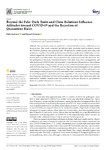Mostrar o rexistro simple do ítem
Beyond the Pale: Dark Traits and Close Relations Influence Attitudes toward COVID-19 and the Rejection of Quarantine Rules
| dc.contributor.author | Espinosa, Pablo | |
| dc.contributor.author | Clemente, Miguel | |
| dc.date.accessioned | 2021-05-18T12:46:27Z | |
| dc.date.available | 2021-05-18T12:46:27Z | |
| dc.date.issued | 2021-04-30 | |
| dc.identifier.citation | Espinosa P, Clemente M. Beyond the Pale: Dark Traits and Close Relations Influence Attitudes toward COVID-19 and the Rejection of Quarantine Rules. International Journal of Environmental Research and Public Health. 2021; 18(9):4838. https://doi.org/10.3390/ijerph18094838 | es_ES |
| dc.identifier.issn | 1660-4601 | |
| dc.identifier.uri | http://hdl.handle.net/2183/27948 | |
| dc.description.abstract | [Abstract] Dark personality traits are predictors of detrimental behavior (e.g., selfishness or violating norms). This research examined the influence dark personality traits on attitudes toward the COVID-19 pandemic and quarantine rules. We determined whether specific dark traits could predict non-compliance, beyond the global measure of dark personality traits. Additionally, previous research suggests that people are more likely to violate rules for the benefits of close relations, rather than for their own self-interests. We examined how this tendency interacts with dark traits. The 823 participants in the study completed measures of the dark triad, moral disengagement, and attitudes toward COVID-19 rules, and responded to vignettes about themselves or close relations escaping quarantine. Using a bifactor model approach, results showed that a general dark factor predicted non-compliance to COVID-19 rules, but that some moral disengagement mechanisms contributed to non-compliance beyond this factor. Vignette results showed that participants were more willing to break quarantine rules for a close relation than for themselves, except for those high in moral disengagement, who broke rules more—regardless of who was involved. These findings have important implications for intervention programs and policies, since individuals with dark traits tend to “selfishly” trespass norms, but anyone can “go beyond the pale, i.e., go outside the limits of acceptable behavior, for a loved one. | es_ES |
| dc.description.sponsorship | Xunta de Galicia; EDC431C2019/18 | es_ES |
| dc.description.sponsorship | This research was funded by Xunta de Galicia, grant number EDC431C2019/18, and Ministerio de Ciencia, Innovación y Universidades grant number DER2017-82390-R | |
| dc.language.iso | eng | es_ES |
| dc.publisher | MDPI | es_ES |
| dc.relation | info:eu-repo/grantAgreement/Xunta de Galicia/2019/EDC431C2019%18/ES-GA | |
| dc.relation | info:eu-repo/grantAgreement/AEI/Plan Estatal de Investigación Científica y Técnica y de Innovación 2017-2020/DER2017-82390-R/ES/POLITICA CRIMINAL Y REFORMA PENAL EN UNA SOCIEDAD EN TRANSFORMACION | |
| dc.relation.uri | https://doi.org/10.3390/ijerph18094838 | es_ES |
| dc.rights | Atribución 4.0 Internacional (CC BY) | es_ES |
| dc.rights.uri | https://creativecommons.org/licenses/by/4.0/ | * |
| dc.subject | Dark traits | es_ES |
| dc.subject | COVID-19 | es_ES |
| dc.subject | Close relations | es_ES |
| dc.subject | Quarantine | es_ES |
| dc.subject | Moral disengagement | es_ES |
| dc.title | Beyond the Pale: Dark Traits and Close Relations Influence Attitudes toward COVID-19 and the Rejection of Quarantine Rules | es_ES |
| dc.type | info:eu-repo/semantics/article | es_ES |
| dc.rights.access | info:eu-repo/semantics/openAccess | es_ES |
| UDC.journalTitle | International Journal of Environmental Research and Public Health | es_ES |
| UDC.volume | 18 | es_ES |
| UDC.issue | 9 | es_ES |
| dc.identifier.doi | 10.3390/ijerph18094838 |
Ficheiros no ítem
Este ítem aparece na(s) seguinte(s) colección(s)
-
GI-ECRIM - Artigos [83]






